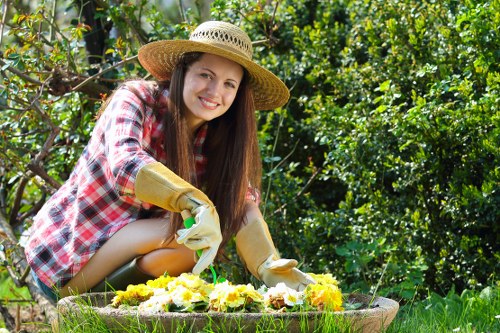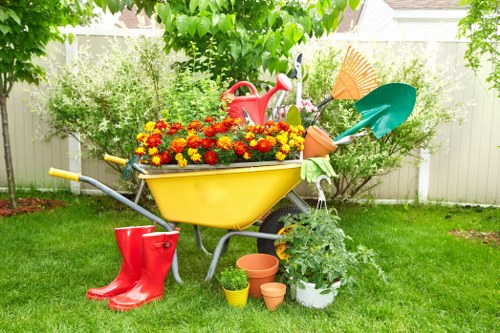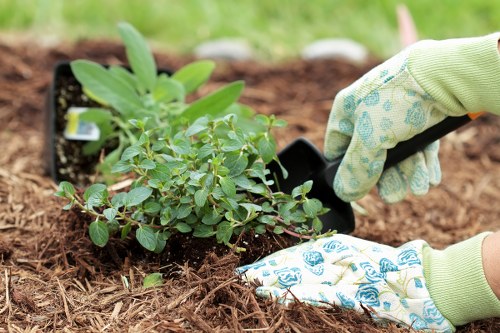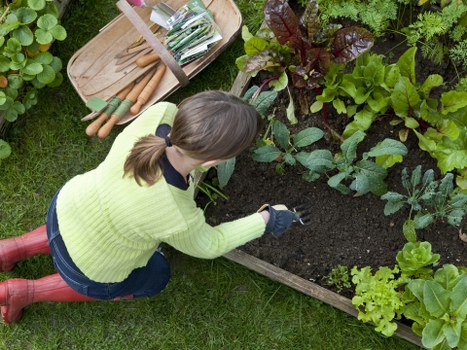Landscaping Finsbury Park: Transforming Urban Spaces into Green Havens

Landscaping Finsbury Park is an essential aspect of maintaining and enhancing the beauty of one of London's most vibrant urban areas. Whether you're a homeowner looking to revamp your garden or a business aiming to create an inviting outdoor space, understanding the nuances of landscaping in Finsbury Park can make a significant difference.
Finsbury Park, located in the heart of London, offers a unique blend of cultural diversity and urban charm. Its landscaping needs reflect the area's dynamic character, requiring designs that are both aesthetically pleasing and functional. From public parks to private gardens, effective landscaping can improve the quality of life for residents and visitors alike.
In this comprehensive guide, we'll explore the key elements of landscaping in Finsbury Park, including plant selection, design principles, sustainable practices, and the importance of local expertise. Whether you're embarking on a small project or a large-scale transformation, these insights will help you achieve stunning results.
The Importance of Landscaping in Finsbury Park

Landscaping plays a crucial role in enhancing the visual appeal and functionality of outdoor spaces. In Finsbury Park, where urban living is prevalent, well-designed landscapes provide a respite from the hustle and bustle of city life.
Effective landscaping can:
- Improve property value
- Create inviting spaces for social interaction
- Enhance environmental sustainability
- Promote mental and physical well-being
By incorporating elements such as greenery, water features, and seating areas, landscaping can transform ordinary spaces into extraordinary retreats.
Moreover, thoughtful landscaping contributes to the overall aesthetics of the neighborhood, fostering a sense of community pride and cohesion. It's not just about individual properties; it's about creating a harmonious environment that benefits everyone.
Key Elements of Landscaping Finsbury Park

When planning a landscaping project in Finsbury Park, several key elements must be considered to ensure a successful outcome. These elements work together to create a balanced and appealing outdoor space.
1. Plant Selection
Choosing the right plants is fundamental to any landscaping project. In Finsbury Park, it's important to select plants that thrive in the local climate and soil conditions.
Consider incorporating a mix of native and ornamental plants to create a diverse and resilient landscape. Native plants are adapted to the local environment and require less maintenance, while ornamental plants add color and variety.
2. Design and Layout
An effective design layout ensures that all elements of the landscape work in harmony. This includes the placement of plants, pathways, water features, and seating areas.
Creating zones within the landscape can help organize space and provide specific areas for different activities. For example, a seating area can serve as a focal point, while a pathway guides visitors through the garden.
3. Sustainability Practices
Sustainable landscaping practices are increasingly important in urban settings like Finsbury Park. These practices not only benefit the environment but also contribute to the longevity and health of the landscape.
Implementing water-efficient irrigation systems, using organic fertilizers, and incorporating native plants are all strategies that promote sustainability.
4. Lighting and Accessories
Proper lighting can enhance the beauty and functionality of outdoor spaces. It allows for the use of the landscape after dark and highlights key features such as pathways and garden beds.
Accessories like garden art, fountains, and benches add character and personalize the space, making it more inviting and unique.
Choosing the Right Landscaping Services in Finsbury Park

Finding the right landscaping services is crucial to achieving your desired outcome. When selecting a landscaping company in Finsbury Park, consider the following factors:
- Experience and expertise in local landscaping
- Portfolio of previous projects
- Client testimonials and reviews
- Range of services offered
- Competitive pricing and value for money
Working with professionals who understand the unique challenges and opportunities of landscaping in Finsbury Park ensures that your project is handled with care and skill.
Additionally, it's beneficial to engage with companies that prioritize communication and collaboration, ensuring that your vision is accurately translated into reality.
Sustainable Landscaping Practices

Embracing sustainable practices in landscaping not only benefits the environment but also contributes to cost savings and long-term viability of your outdoor space.
Water Conservation
Implementing efficient irrigation systems, such as drip irrigation, reduces water waste and ensures that plants receive adequate moisture without excess runoff.
Rainwater harvesting is another sustainable practice that captures and utilizes rainwater for irrigation purposes, minimizing reliance on municipal water sources.
Organic Gardening
Using organic fertilizers and pest control methods promotes soil health and reduces the presence of harmful chemicals. Composting kitchen and garden waste can enrich the soil naturally.
Native Plants
Incorporating native plants into your landscape design supports local biodiversity and requires less maintenance, as these plants are well-adapted to the local climate and soil conditions.
Energy-Efficient Lighting
Choosing energy-efficient lighting options, such as LED fixtures, reduces electricity consumption and lowers environmental impact while still providing adequate illumination.
Local Expertise: Why It Matters
Working with local landscaping experts in Finsbury Park ensures that your project benefits from their knowledge of the area's specific climate, soil types, and plant varieties. Local professionals are better equipped to address challenges unique to the region, such as urban pollution, space constraints, and community regulations.
Moreover, local landscapers often have established relationships with suppliers and can source materials that are both high-quality and suited to the local environment. Their familiarity with nearby areas also allows them to create designs that complement the surrounding neighborhood, enhancing the overall aesthetic appeal.
Investing in local expertise leads to more sustainable and harmonious landscape designs that stand the test of time.
In conclusion, landscaping Finsbury Park offers a myriad of opportunities to transform urban spaces into green, welcoming environments. By understanding the key elements, embracing sustainable practices, and partnering with local experts, you can create a landscape that not only looks beautiful but also enriches the lives of those who enjoy it.
Top Areas Near Finsbury Park for Landscaping Projects
Finsbury Park is surrounded by a variety of neighborhoods, each offering unique characteristics that influence landscaping needs and opportunities. Here are some of the closest areas to Finsbury Park where landscaping projects thrive:
- Crouch End: Known for its eclectic mix of homes, Crouch End benefits from lush gardens and community parks.
- Harringay: This vibrant area features a blend of residential and commercial spaces, perfect for versatile landscaping designs.
- Stroud Green: With its stunning Victorian architecture, Stroud Green complements its buildings with beautiful landscapes.
- Manor House: Home to several green spaces, Manor House offers ample opportunities for outdoor enhancements.
- Highbury: Combining historical sites with modern living, Highbury is ideal for classic and contemporary landscaping styles.
- Finsbury Park itself: A central hub with expansive parks and recreational areas that can be further beautified.
- Hornsey: This area is ideal for sustainable and community-focused landscaping projects.
- Pimlico: Known for its sophisticated charm, Pimlico benefits from elegant and refined landscape designs.
- Islington: A bustling district where innovative and space-efficient landscaping solutions are in demand.
- Clissold Park: Featuring one of Finsbury Park's prominent parks, Clissold Park is a centerpiece for landscaping projects.
- Teddington: Offering a mix of residential tranquility and commercial vibrancy, Teddington is perfect for diverse landscaping ideas.
- Enfield: With its rich history, Enfield presents opportunities for traditional and heritage-inspired landscaping.
- Wood Green: This commercial hub demands dynamic and resilient landscaping to complement its urban setting.
- Tottenham: A diverse community that appreciates creative and inclusive landscaping approaches.
- Chalk Farm: Known for its cultural scene, Chalk Farm benefits from artistic and thematic landscaping designs.
FAQs
1. What types of plants are best suited for landscaping in Finsbury Park?
Plants that thrive in the local climate and soil conditions, including native species and ornamental varieties, are ideal. Consider factors like sunlight, water requirements, and maintenance when selecting plants.
2. How can I make my landscaping project more sustainable?
Incorporate sustainable practices such as using native plants, implementing efficient irrigation systems, composting organic waste, and choosing energy-efficient lighting to reduce environmental impact.
3. How do I choose the right landscaping service in Finsbury Park?
Look for experienced local professionals with a strong portfolio, positive client reviews, a comprehensive range of services, and competitive pricing. It's also important to ensure they understand your vision and needs.
4. What are the trends in landscaping for urban areas like Finsbury Park?
Current trends include the use of vertical gardens, sustainable and drought-resistant plants, outdoor living spaces, and the integration of technology for smart irrigation and lighting systems.
5. How does landscaping impact property value in Finsbury Park?
Well-designed landscaping can significantly enhance curb appeal, making properties more attractive to potential buyers or renters. It can also create functional outdoor spaces, adding to the overall value of the property.




